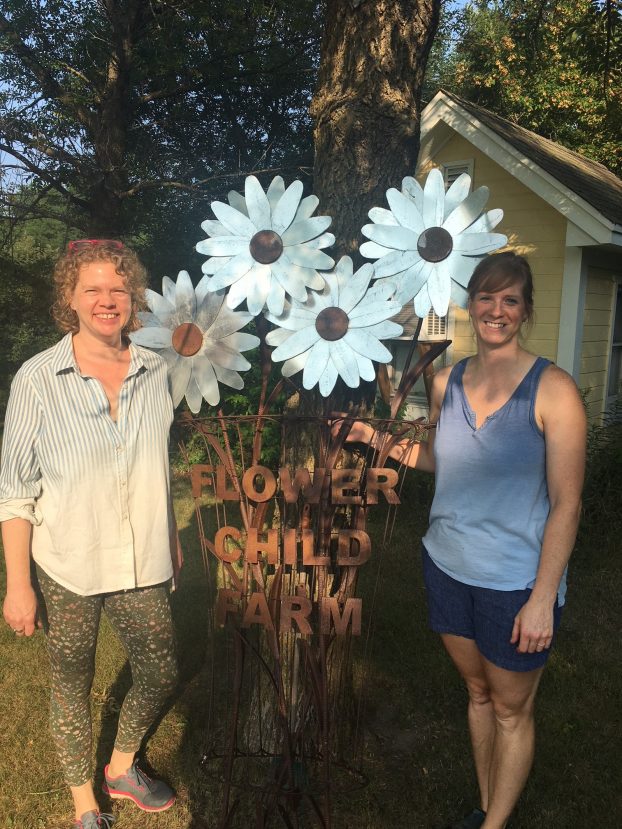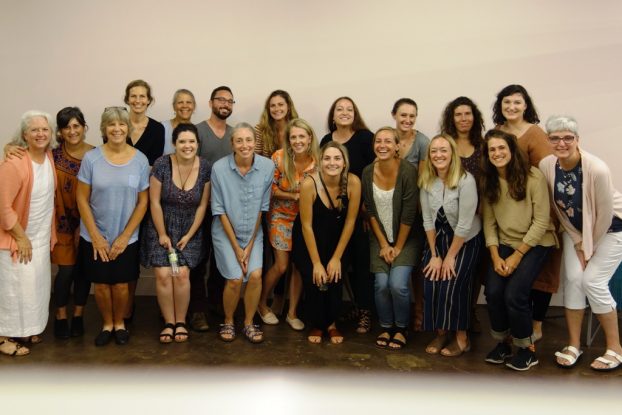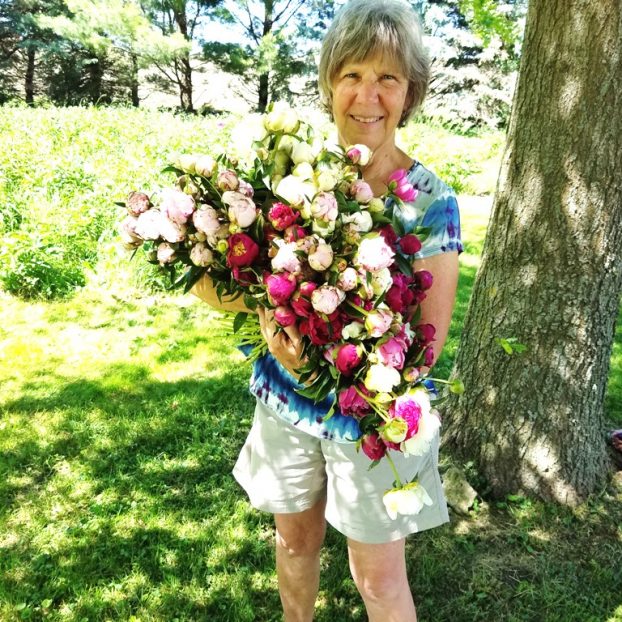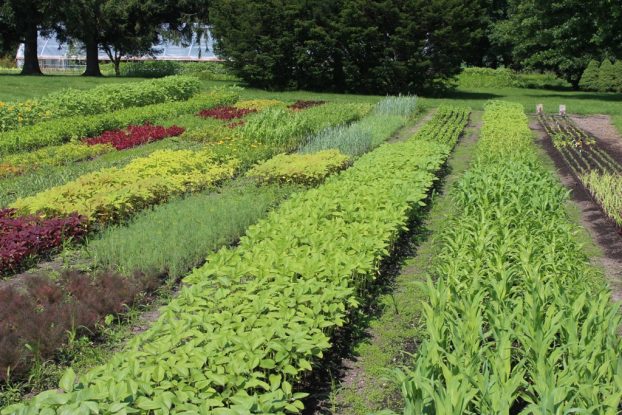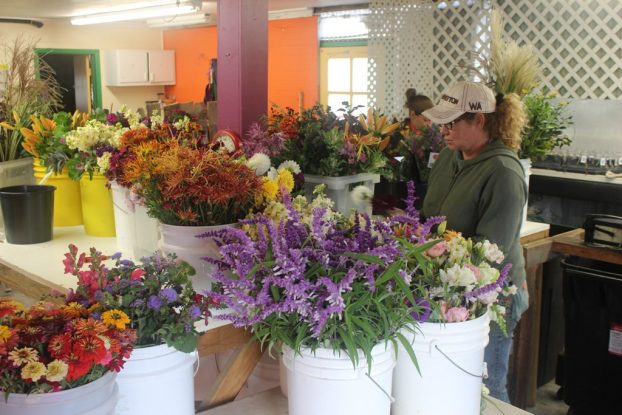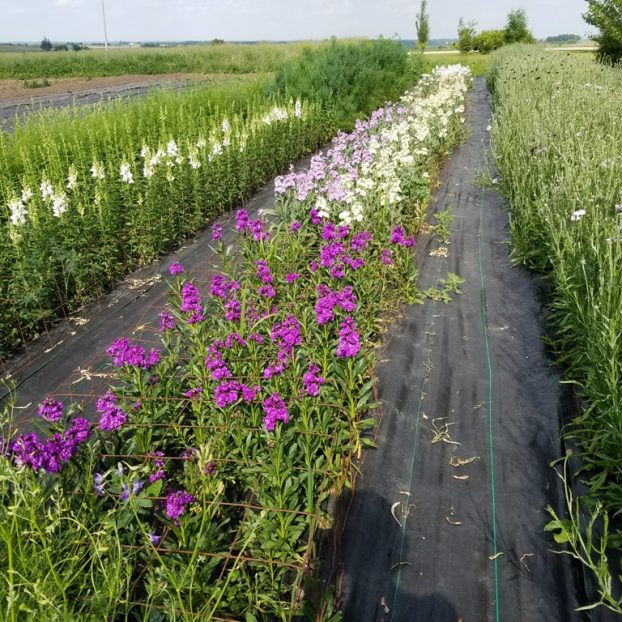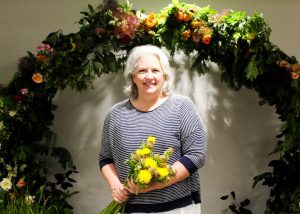Episode 363: Grower Wisdom with Jeanie McKewan of Illinois’s Brightflower Farm
August 22nd, 2018
Podcast: Play in new window | Download
Subscribe: Apple Podcasts | Google Podcasts | Podcast Index | RSS | More
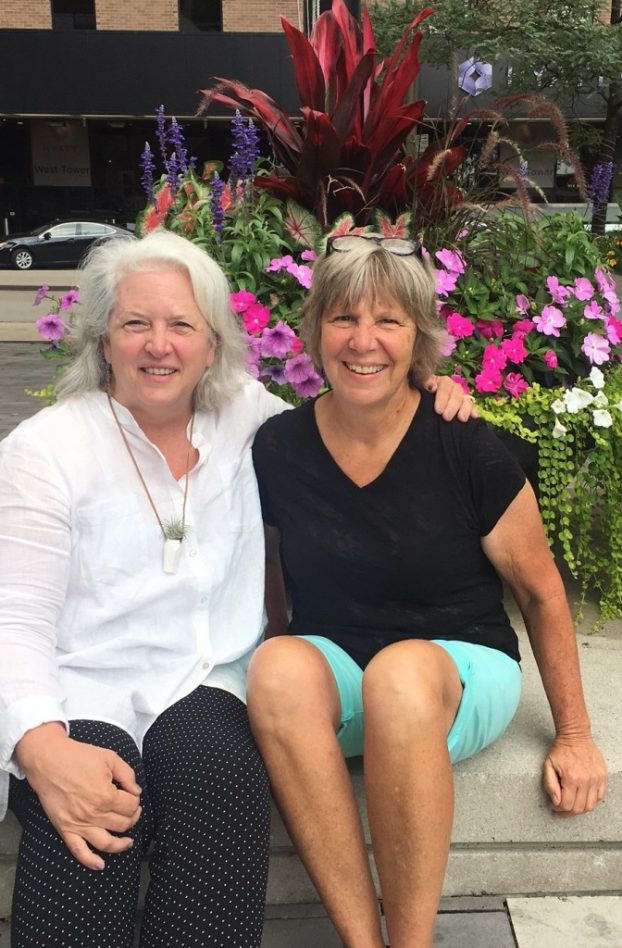
Jeanie and I had a wonderful reunion in Chicago last week. This photograph was taken in front of the Chicago Hyatt after recording our interview.
I’ve been on the road for more than a week and connecting with Slow Flowers members and sponsors has been at the heart of my travel. Before we jump into today’s conversation with a wonderful featured guest, I’d love to thank a few folks with my shout-outs!
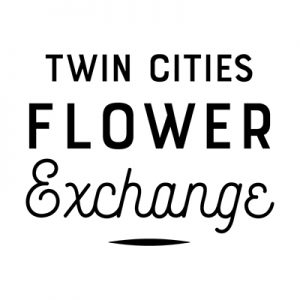 First, on August 11 & 12, I was hosted by Christine Hoffman of Twin Cities Flower Exchange in St. Paul, Minneapolis, where I enjoyed a sneak peek into what’s in store for attendees of next year’s Slow Flowers Summit, July 1-2, 2019.
First, on August 11 & 12, I was hosted by Christine Hoffman of Twin Cities Flower Exchange in St. Paul, Minneapolis, where I enjoyed a sneak peek into what’s in store for attendees of next year’s Slow Flowers Summit, July 1-2, 2019.
As I’ve mentioned in recent weeks, Christine and the TCFE are co-hosting the Summit in their wonderful Twin Cities, where the local floral scene is alive, well, thriving and growing.
In addition to arranging for me to visit two of the flower farms that sell their botanical harvest through the TCFE, Christine took me to see three potential venues for the Summit sessions next summer. It’s often quite challenging to manage and plan an event long-distance, so this was hugely important.
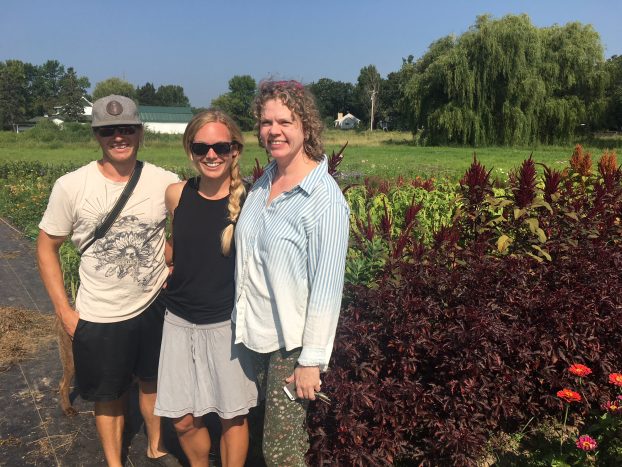
At Beezie’s Blooms, a farm portrait with owners Jeff & Randi, with Christine Hoffman of Twin Cities Flower Exchange
It was a major treat to visit Beezie’s Blooms, a Slow Flowers member farm owned by Randi Greiner, and to tour Allison DeRungs’ Flower Child Farm, both located on beautiful properties north of the metro area.
On Sunday afternoon, Christine hosted a meet-up-style open house to introduce me to the local floral community – farmers and floral designers who comprise the dynamic change taking place there. We tasted signature cocktails with a floral note (of course), sample butters flavored with petals and herbs to spread on delicious local bread, and munched on local veggies, all part of the festive day.
It was inspiring and encouraging – all inside The Good Acre, a certified organic hub for local food distribution. That place holds state-of-the-art equipment and huge walk-in coolers where yes, produce from local farms is processed for distribution to school lunch rooms, but where every Wednesday florists and designers come to shop for flowers from as many as a dozen Minnesota and Wisconsin flower farms.
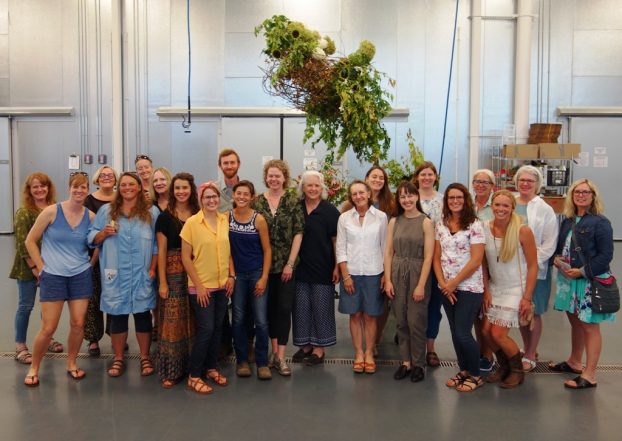
Twin Cities Flower Exchange hosted a wonderful gathering of local flower farmers and floral designers to welcome me to the Minneapolis-St. Paul area! Our gathering took place inside The Good Acre food hub, where flowers make an appearance once a week.
Seeing where it all happens after hearing Christine’s description of the TCFE’s “home” on the Slow Flowers Podcast last year, was such a treat. If you attend the Slow Flowers Summit next year during American Flowers Week, you’ll be able to experience this exciting new economic model taking place first hand, too.
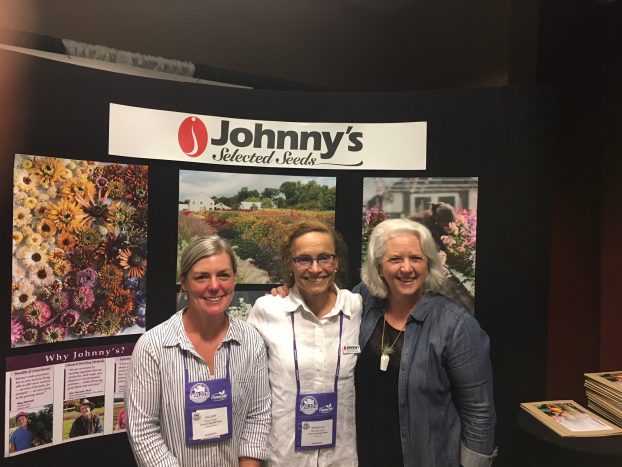
It was so fabulous to partner with Hillary Alger (left) and Marcella Sweet (center) at the Johnny’s Seeds booth during the Garden Writers Annual Symposium last week!
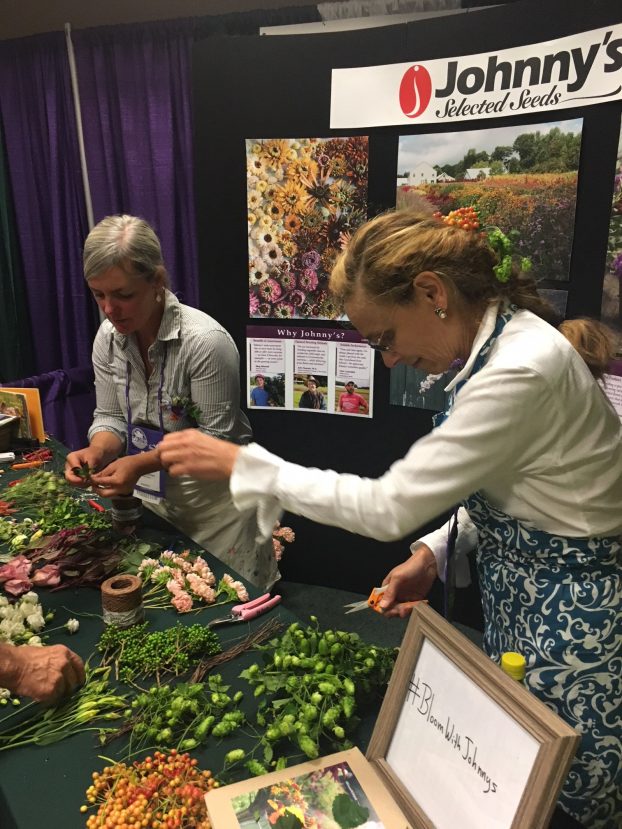
Hillary, Marcella and I hosted the incredibly popular pin-on flower bar at the GWA Chicago Expo, teaching media (writers, editors & bloggers) about cut flower gardening.
I said good-bye to the Twin Cities and headed straight to Chicago last Monday, where I spent most of the week attending the annual Garden Writers Association Symposium & Expo. I’ve been deeply involved in this professional organization – my original Tribe before the Slow Flowers Tribe emerged as a huge part of my life.
At the GWA conference, there is a trade show for two days, where garden and plant vendors exhibit their new products and wares. I joined Hillary Alger and Marcella Sweet of Johnny’s Selected Seeds, a sponsor of this Podcast and all my Slow Flowers channels at that trade show.
I’m so grateful to them and to Johnny’s for investing in bringing the Johnny’s resources and message about growing-your-own-flowers to the garden media – editors, writers, bloggers and broadcasters – my peers – who enjoyed picking up cutting garden tools, plans and images for use in their columns and posts.
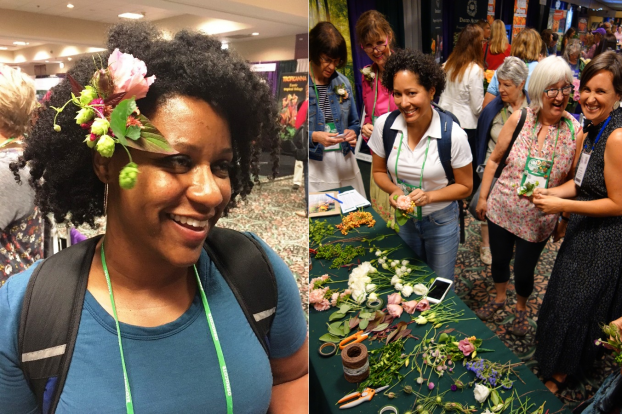
It was so fun to watch my fellow GWA members try their talents at making mini bouquets and pin-on flowers!
Hillary and Marcella and I spoke with hundreds of garden communicators interested in new story ideas, and we spent the 2nd afternoon of the trade show running what we called the “pin-on flower bar,” where we encouraged conference attendees to make their own boutonniere or corsage. What made this hands-on experience more special was the chance to showcase exquisite flowers, herbs, berries and foliage from local Slow Flowers member farms. Thank you to Heidi Joynt and Molly Kobelt of Field & Florist; Jeanie McKewan of Brightflower Farm and Beth Barnett of Larkspur Chicago for sending us their best.
Click here to view and download Johnny’s Selected Seeds’ cutting garden resources.
That only took me through mid-week, and over the course of five days I participated in all sorts of Garden Writers activities. But being in Chicago also afforded me time for the second Slow Flowers Meet-up in the Windy City.
Last Wednesday night, thanks to Beth Barnett, about 18 of us joined together in her beautiful new Larkspur Chicago studio for an after-hours meet-up where we talked flowers, shared personal stories and enjoyed drinks and bites while making new connections and renewing established ones. I’m so grateful to the many who made the time to attend: flower farmers who traveled two to three hours into the city for our evening together; florists who closed busy retail shops or broke away from producing flowers in their studios to come for a special gathering of kindred spirits.
Thank you so much to Kath LaLiberte of Longfield Gardens, a sponsor of this podcast, and to Mackenzie Nichols, a writer and floral designer friend from New York, both of whom were in Chicago to attend the conference with me! They joined me in shopping for food and wine and helped Beth and me get everything set up for the fun. It was a great night. Just as I felt leaving the party at the Twin Cities Flower Exchange, it was so rewarding to invest in the time to make face-to-face connections with Chicago’s Slow Flowers Community. Thanks to all who helped make it happen.
NOW . . . Let me introduce today’s great guest, Jeanie McKewan of Brightflower Farm in Stockton, Illinois.
As you heard, Jeanie’s flowers wowed the garden communicators who made their personal pin-on flowers at the conference last week – I have to say, the big hit was privet berry in its green form. That stumped a lot of my friends and prompted a number of internet searches on smart phones before we knew what it was.
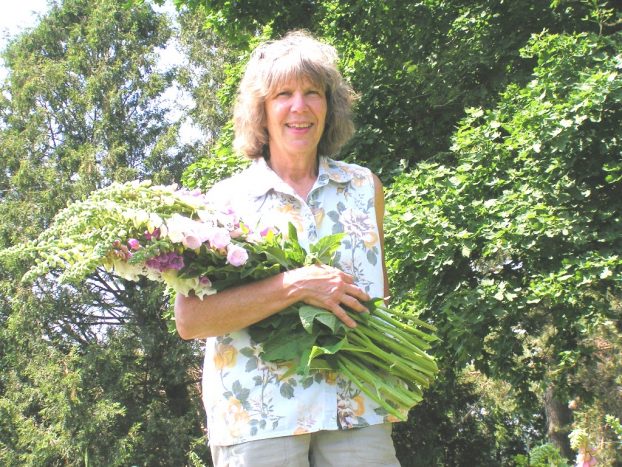
Jeanie McKewan grows cut flowers for Illinois and Wisconsin area flower farmers and Chicago’s Whole Foods stores.
I’ve known Jeanie since 2012, when we met in Tacoma at the Association of Specialty Cut Flower Growers annual conference. You’ll hear the full story in our conversation, so listen closely. I’ve also wanted to host Jeanie on the Slow Flowers Podcast forever, so once we were in the same city I had to grab the chance. The morning after our Meet-Up, I met Jeanie for breakfast and then we recorded this conversation to share with you.
Let me tell you a little more about this gifted floral entrepreneur:
Jeanie McKewan brings more than a dozen years of horticultural experience, passion and commitment to growing the finest plant materials available. She earned her Environmental Science degree from Willamette University, a Plant Pathology degree from Oregon State University, and is a Certified Landscape Professional (CLP).
Her working career gave her several opportunities to start businesses for entrepreneurs. In 1996 she was General Manager of Montale Gardens in Wauconda, Illinois, and served for nearly two years as Nursery Operations Manager for award-winning Craig Bergmann Landscape Design before founding her own growing operation.
As founder of Brightflower Farm, she is devoted to providing beauty and fullness of life through her plants and flowers. Growing plants, eating good, flavorful food, and producing a stunning and colorful array of flowers is her passion and she feels incredibly fortunate to be able to earn a livelihood providing people with all of these things!
You’ll gain volumes from our conversation – I promise. We had a fabulous reunion and even though I’ve interviewed Jeanie in the past, I learn a lot more from her. This fascinating and experienced flower farmer is incredibly open in sharing her insights with others. You’ll hear that, too.
Follow Jeanie and her flower-filled world at these social places:
Brightflower Farm on Instagram
Here’s more information about the University of Wisconsin-Madison’s Wisconsin Cut Flower Growers School, where Jeanie teaches each February
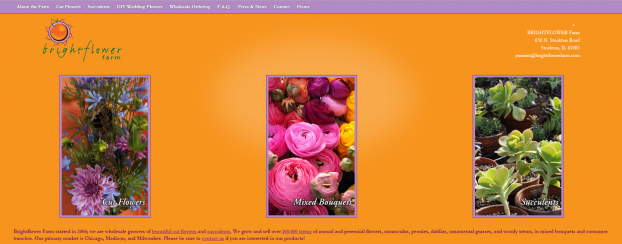 Here’s a bonus, too! I mentioned the two of us met in 2012. One of the outcomes of that time together during the ASCFG meeting was Jeanie bidding on a chance to be interviewed by me for a feature story. She’s given me permission to share that story, titled, “Illinois Blooms for Midwest Vases,” which is posted on the Brightflower Farm web site. It was incredibly fun to write and I think you’ll find it fascinating to read.
Here’s a bonus, too! I mentioned the two of us met in 2012. One of the outcomes of that time together during the ASCFG meeting was Jeanie bidding on a chance to be interviewed by me for a feature story. She’s given me permission to share that story, titled, “Illinois Blooms for Midwest Vases,” which is posted on the Brightflower Farm web site. It was incredibly fun to write and I think you’ll find it fascinating to read.
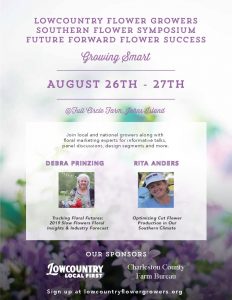 Traveling is often exhausting but I found the past ten days exhilarating and inspiring.
Traveling is often exhausting but I found the past ten days exhilarating and inspiring.
From visiting flower farms to spending time with floral designers to promoting cutting gardens to fellow communicators – it was a packed week, but a rewarding one.
Next up, I’ll be attending the Southern Flower Symposium in Charleston, South Carolina, hosted by many Slow Flowers members and the core group called Lowcountry Flower Growers.
I’ll join Rita Anders of Cuts of Color, a past guest of this podcast, to speak on flower farming, floral design, and my upcoming 2019 Slow Flowers’ Floral Insights and Industry Forecast.
The Symposium takes place August 26-27th so check out links to learn how you can attend.
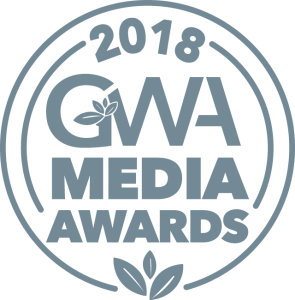 Last week’s Midwest trip ended at the Garden Writers Association annual awards ceremony where Slow Flowers took home two Silver Media Awards for Excellence in Communications.
Last week’s Midwest trip ended at the Garden Writers Association annual awards ceremony where Slow Flowers took home two Silver Media Awards for Excellence in Communications.
I wanted to share that news with you, because this Podcast earned a Silver Award for broadcast programming!
Your support of the Slow Flowers Podcast is what keeps me going week in and week out.
What an honor to also be recognized by my peers.
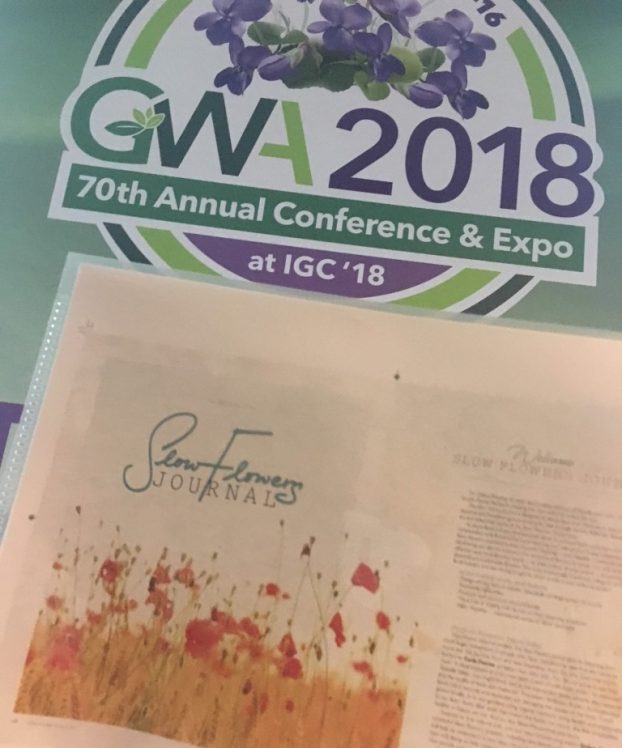 And our one-year-old project, the Slow Flowers Journal, also received a Silver Award in the Trade magazine category. It’s a monthly commitment to write and produce 10 to 16 pages of original and relevant editorial content for my wonderful publishing partner, Florists’ Review, and receiving accolades from fellow members of the media is an endorsement that motivates me to keep going when deadlines loom!
And our one-year-old project, the Slow Flowers Journal, also received a Silver Award in the Trade magazine category. It’s a monthly commitment to write and produce 10 to 16 pages of original and relevant editorial content for my wonderful publishing partner, Florists’ Review, and receiving accolades from fellow members of the media is an endorsement that motivates me to keep going when deadlines loom!
This role as the Slow Flowers champion is one that fills me with gratitude and I thank the entire community of flower farmers and floral designers who together define the Slow Flowers Movement.
As our cause gains more supporters and more passionate participants who believe in the importance of the American cut flower industry, the momentum is contagious.
I know you feel it, too. I value your support and invite you to show your thanks and with a donation to support my ongoing advocacy, education and outreach activities. You can find the donate button in the column to the right.
The Slow Flowers Podcast has been downloaded more than 350,000 times by listeners like you. Thank you for listening, commenting and sharing – it means so much.
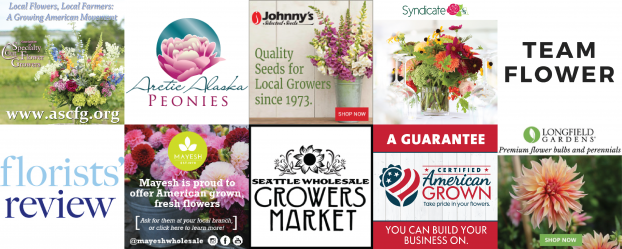 Thank you to our sponsors who have supported Slow Flowers and all our programs.
Thank you to our sponsors who have supported Slow Flowers and all our programs.
Florists’ Review magazine. I’m delighted to serve as Contributing Editor for Slow Flowers Journal, found in the pages of Florists’ Review. It’s the leading trade magazine in the floral industry and the only independent periodical for the retail, wholesale and supplier market.
Arctic Alaska Peonies, a cooperative of passionate family farms in the heart of Alaska providing bigger, better peony flowers during the months of July and August. Visit them today at arcticalaskapeonies.com
Seattle Wholesale Growers Market, a farmer-owned cooperative committed to providing the very best the Pacific Northwest has to offer in cut flowers, foliage and plants. The Growers Market’s mission is to foster a vibrant marketplace that sustains local flower farms and provides top-quality products and service to the local floral industry. Find them at seattlewholesalegrowersmarket.com
Longfield Gardens provides home gardeners with high quality flower bulbs and perennials. Their online store offers plants for every region and every season, from tulips and daffodils to dahlias, caladiums and amaryllis. Visit them at longfield-gardens.com.
Syndicate Sales, an American manufacturer of vases and accessories for the professional florist. Look for the American Flag Icon to find Syndicate’s USA-made products and join the Syndicate Stars loyalty program at syndicatesales.com.
Johnny’s Selected Seeds, an employee-owned company that provides our industry the best flower, herb and vegetable seeds — supplied to farms large and small and even backyard cutting gardens like mine. Check them out at johnnysseeds.com.
Association of Specialty Cut Flower Growers. Formed in 1988, ASCFG was created to educate, unite, and support commercial cut flower growers. It mission is to help growers produce high-quality floral material, and to foster and promote the local availability of that product. Learn more at ascfg.org
Mayesh Wholesale Florist. Family-owned since 1978, Mayesh is the premier wedding and event supplier in the U.S. and we’re thrilled to partner with Mayesh to promote local and domestic flowers, which they source from farms large and small around the U.S. Learn more at mayesh.com.
Certified American Grown Flowers. The Certified American-Grown program and label provide a guarantee for designers and consumers on the source of their flowers. Take pride in your flowers and buy with confidence, ask for Certified American Grown Flowers. To learn more visit americangrownflowers.org.
And the Team Flower Conference – a professional floral event where flower lovers from all over the world gather for networking, learning, and celebration. It’s a special time for the floral industry to come together and whether you’re a farmer, designer, wholesaler, or just love flowers, you’re invited to attend as Team Flower dreams big for the floral industry’s future. You can head to teamflower.org/slowflowers to learn more about the 2019 conference in Waco, Texas!
I’m Debra Prinzing, host and producer of the Slow Flowers Podcast. Next week, you’re invited to join me in putting more American grown flowers on the table, one vase at a time. And If you like what you hear, please consider logging onto iTunes and posting a listener review.
The content and opinions expressed here are either mine alone or those of my guests alone, independent of any podcast sponsor or other person, company or organization.
The Slow Flowers Podcast is engineered and edited by Andrew Brenlan. Learn more about his work at soundbodymovement.com.









